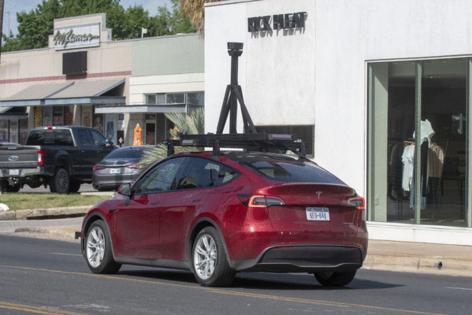Tesla will start testing its robotaxis in the Bay Area, report says
Published in Automotive News
Elon Musk may be bringing his robotaxis to the Bay Area soon to compete head to head with the other leaders in the driverless vehicle market.
Tesla plans to launch an invite-only service in the Bay Area as soon as this weekend, according to a Business Insider report citing an internal company memo.
The move comes about a month after Tesla robotaxis hit the roads in Austin, Texas. The vehicles, which are still being tested using human co-pilots to monitor their movements and help them get out of tough traffic situations, have drawn scrutiny for behaving oddly.
Musk has touted the abilities and potential of his company's self-driving technology for years. The pressure to deliver on his promises has risen as Tesla's electric vehicle sales decline.
The chief executive has increasingly banked the future of the company on a successful robotaxi service and developing other robotics, including the humanoid robot Optimus.
On Thursday, Musk shared a post on his social media platform X, discussing how Tesla's latest self-driving software is able to take into account 10 times more parameters as it guides cars. In theory this should give vehicles more awareness of their surroundings to drive better.
On Wednesday, the company reported a 16% year over year decline in automotive sales for the second quarter. Total revenue fell 12% to $22.5 billion.
Musk faces a crowded field of competitors in the robotaxi space, including Waymo, which has operated in San Francisco since 2022 and began service in Los Angeles late last year. Waymo is owned by Google's parent company Alphabet. Amazon is testing its own robotaxi effort, Zoox, in several cities.
In the U.S., Waymo is well ahead of the competition, having already completed millions of driverless rides. Its vehicles are operating without backup human co-pilots.
As Tesla scrambles to catch up, the company also faces a lawsuit from the Department of Motor Vehicles accusing Tesla of leading buyers to believe that its vehicles can operate autonomously. A semi-autonomous feature known as Full Self-Drive mode is widely available in Tesla vehicles, but it cannot be used without a human in the driver's seat.
Several incidents have been reported by Tesla drivers using FSD, leading to a National Highway Traffic Safety Administration investigation that begun last year.
Musk has lofty ambitions for the feature, claiming that one day customers will be able to sleep in the back of their Tesla as it drives across the country. Musk has also advertised an Uber-like service in which Tesla owners can earn money by deploying their autonomous vehicle as a taxi.
Last October, Musk unveiled a prototype for the Cybercab, a self-driving vehicle that lacks a steering wheel and pedals. Although he made promises that a fleet of Cybercabs would soon transport customers in several cities, the robotaxis currently operating in Austin are Model Y Teslas. Musk has not updated his timeline for launching the Cybercab.
Tesla shares have fallen more than 16% this year following a series of setbacks for the company, including brand damage and plateauing interest in electric vehicles.
Tesla fell out of favor with many potential buyers while Musk served a prominent role in the Trump administration earlier this year. His subsequent feuds with the president have further alienated customers, especially those who are liberal-leaning.
On an earnings call this week, Musk warned that the company could have "a few rough quarters," partially in response to an expiring electric vehicle tax credit that makes it more affordable to purchase a new or used EV. The $7,500 credit will be eliminated at the end of September as dictated in President Trump's recent megabill.
Tesla bull Dan Ives predicted that autonomous technology could be a $1 trillion venture for Tesla. Musk aims to have robotaxi services available to half the U.S. population by the end of 2025, Ives said in a note.
©2025 Los Angeles Times. Visit at latimes.com. Distributed by Tribune Content Agency, LLC.








Comments